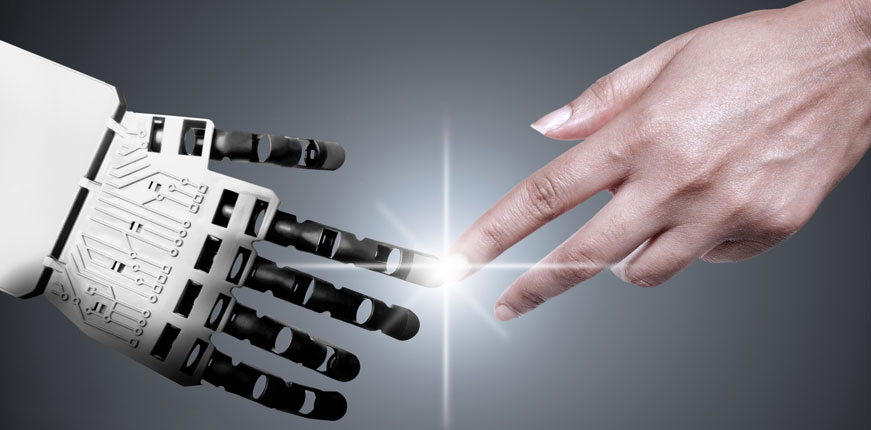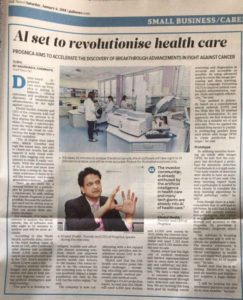
Source: Gulf News

Dubai-based AI-powered health care start-up — Prognica — is aiming to improve clinical outcomes and accelerate the discovery of breakthrough advancements in the fight against cancer.
Khalid Shaikh, founder and CEO of the company, told Gulf News that the process is to first digitise the blood sample slides through a microscope, scan the whole slides and upload onto the cloud by converting the large image into a binary metadata.
“The AI engine then takes over, which classify and tag the visual data, not only to churn out results, but also support it with visual evidence (like tagging & annotations) to make it easily verifiable. With the advancement of AI, as more and more new data keep coming in, the machine continues to learn by itself like humans. And it starts generating solutions,” he said.
There is no need for a manual review by a pathologist by putting a slide under a microscope, he said, adding that remote diagnosis is made possible, because the pathologist need not be sitting next to the microscope or blood slide. They can access from anywhere, anytime.
For example, if it takes 30 minutes to analyse the blood sample, the AI software will take eight to 10 minutes to analyse and will be more accurate.
According to Abu Dhabi Health Authority’s stats, cancer is the third leading cause of death in UAE, after cardiovascular disease and accidents. About 4,500 new cases of cancer are reported every year in the UAE, which amount to almost 12 new cases a day.
Prognica analyses medical images and generates information and data to help predict and diagnose cancer using artificial intelligence and deep learning.
“Our goal is to develop intelligent, scalable and affordable disease screening solutions which can empower medical experts and facilitate quality health care delivery to the masses. Our initial focus is on the solutions for the screening tests so that we can positively impact a larger population not only in UAE but the entire region,” he said.
The company is now collaborating with few reputed health care providers and institutions across UAE to develop its product.
Shaikh said that the UAE health care sector poses two major challenges — recruiting, educating and sustaining enough quality medical personnel; and medical costs.
Quoting a HAAD projection report, he said that Abu Dhabi will need 4,800 new doctors and 13,000 new nurses by 2022, while the Director General of the DHA estimated that Dubai will need 7,323 more doctors and 8,510 nurses over the next decade. Shaikh added that the high cost of medical treatment and limited superspecialised care in areas such as oncology and cardiology are driving outbound medical tourism. “We have a clear vision — to reinvent cost effective disease management through early detection and intervention. We are tackling this long term goal by making cancer screening and diagnostics as accurate and accessible as possible, by using advanced analytics tools like image processing and deep learning, Natural Language Processing (NLP) to improve patient care, hospital administration, supply chain and logistic efficiencies.” he said.
“Our method is primarily based on a convolutional neural network (CNN) and the Wide Res Net 50 residual network formulation. In our approach, we first trained the CNNs on a suitable set of test data sets. Then we applied the trained deep model to partially overlapping patches from each whole slide image (WSI) to create prediction heatmaps,” he said.
By utilising machine learning on whole slide images (WSI), he said that the company has developed a prototype for automatic detection of metastasis in a lymph node. “Our early results of detection were shown to have an accuracy of up to 73 per cent. Our deep learning expert team and a pathologist is needed to work closely to translate the deep learning algorithms to digital pathology tasks,” he said.
Even though there is a misconception that AI will lead to job losses, he said that it is not that AI will entirely replace histopathologists, but rather it will provide increased efficiency and accuracy to the diagnosis, by providing a preliminary diagnosis much faster.
“My software is focusing on algorithms and it will facilitate the pathologist’s task. The investor community is already enthused by the artificial intelligence in health care and many tech giants are already into AI of health care,” he said.
Shaikh said that he is investing Dh500,000 in the next six months and this project requires a huge investment. “I will be looking for two investment partners only after six to nine months,” he said.

